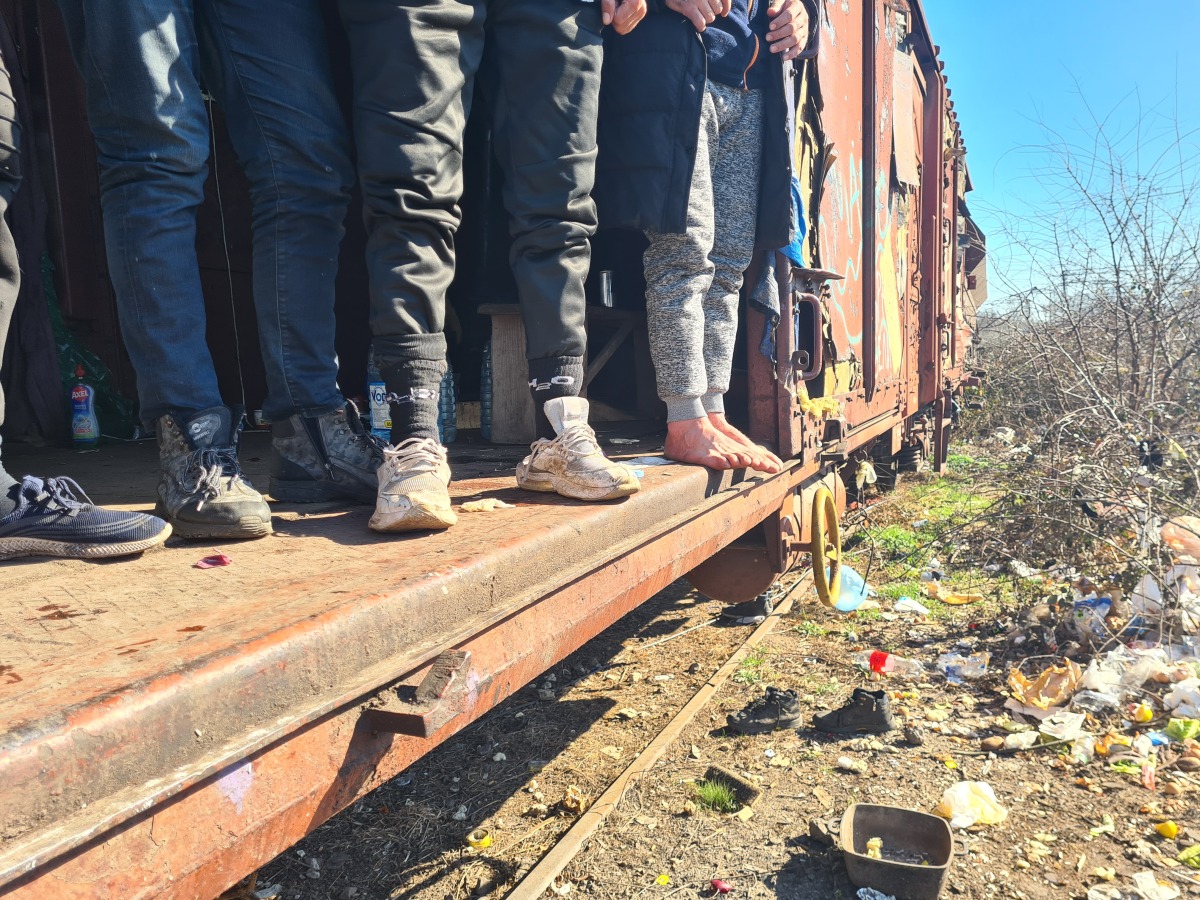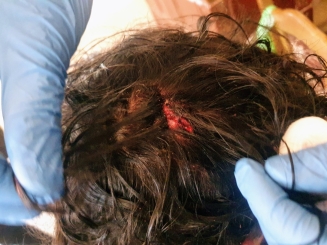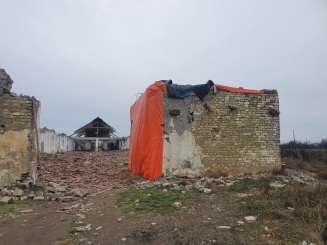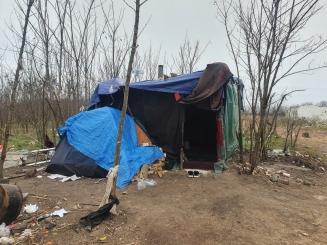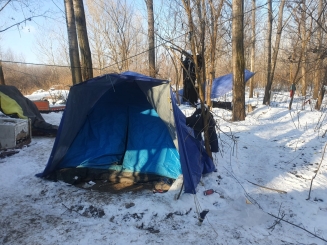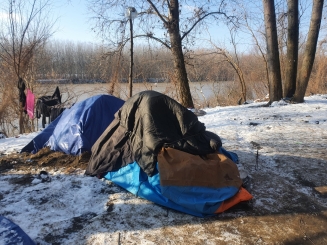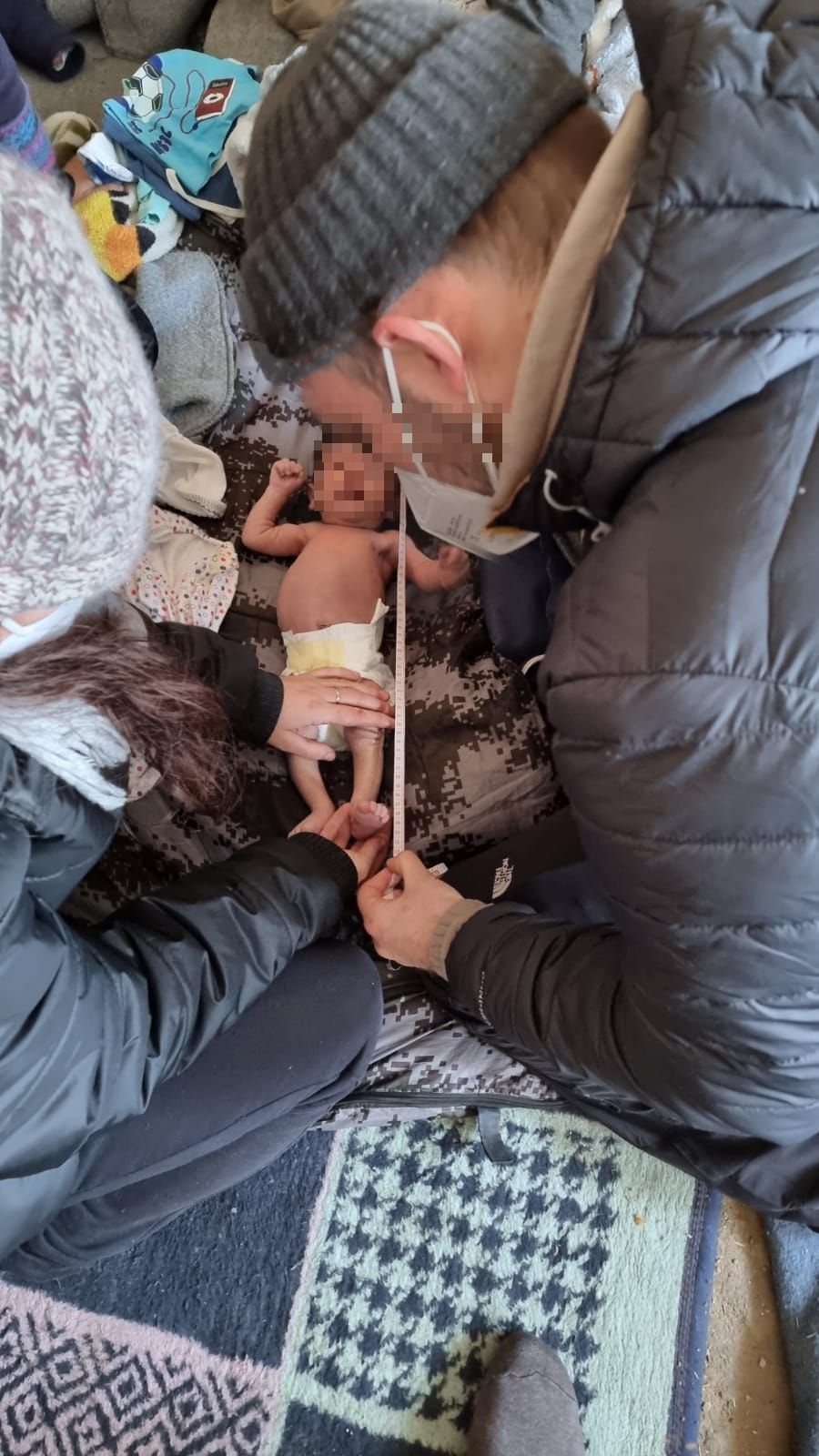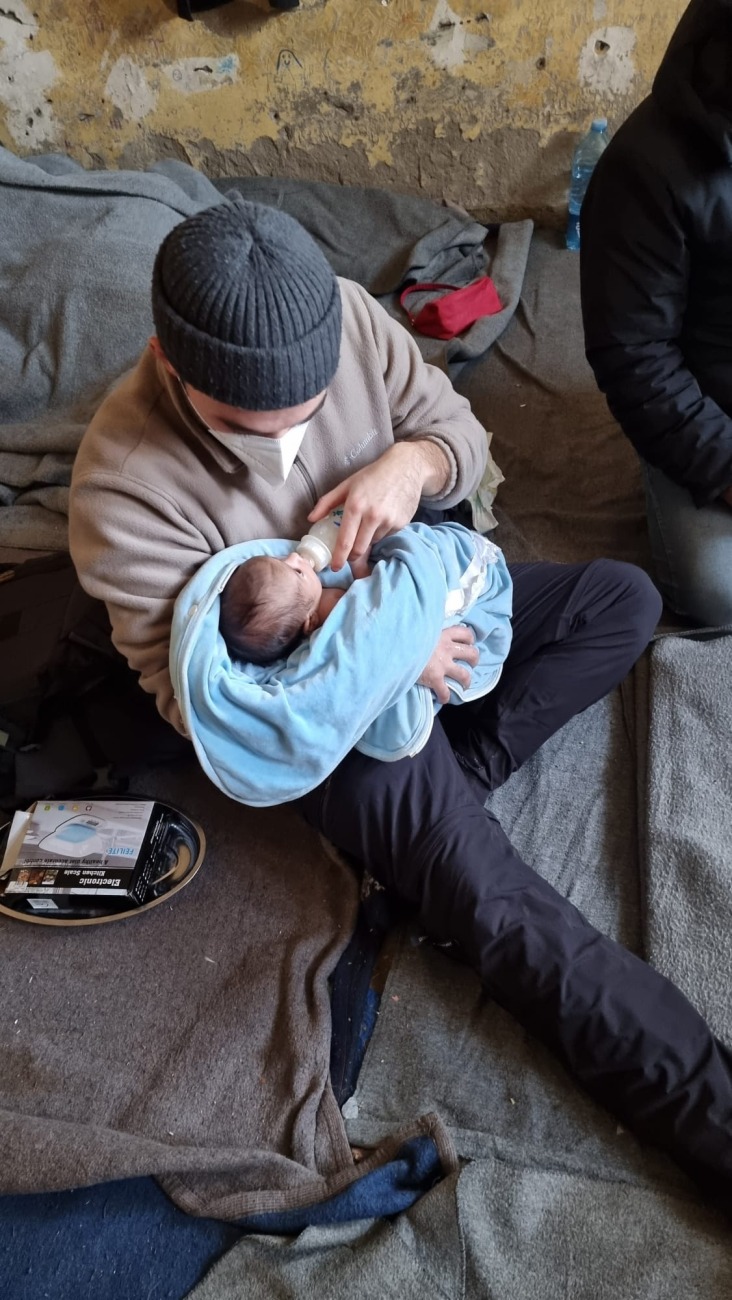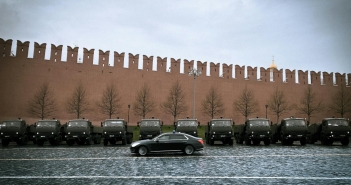On the last day of February, the first Ukrainian refugees arrived in Serbia. Radoš Đurović, the director of the Center for the Protection and Assistance of Asylum Seekers in Serbia believes that approximately 600,000 Ukrainian refugees will come to Hungary and will be expecting them to come to Serbia, once Hungary has reached capacity.
Despite the Russian National anthem being played at train stations in Serbia and pro-Russian protests happening in Belgrade. Nonetheless, Radoš Đurović states that ‘Ukrainians think of Serbia as a friendly country.’ The question is where is this friendliness to other nationalities?
Medical Volunteers International have been providing medical care along the EU borders in the Balkans and have witnessed the abuse that is being carried out at the hands of the EU, as well as those whose job is to protect the people.
A press release by UNHCR just last month states: ‘What is happening at European borders is legally and morally unacceptable and must stop. Protecting human life, human rights and dignity must remain our shared priority.’
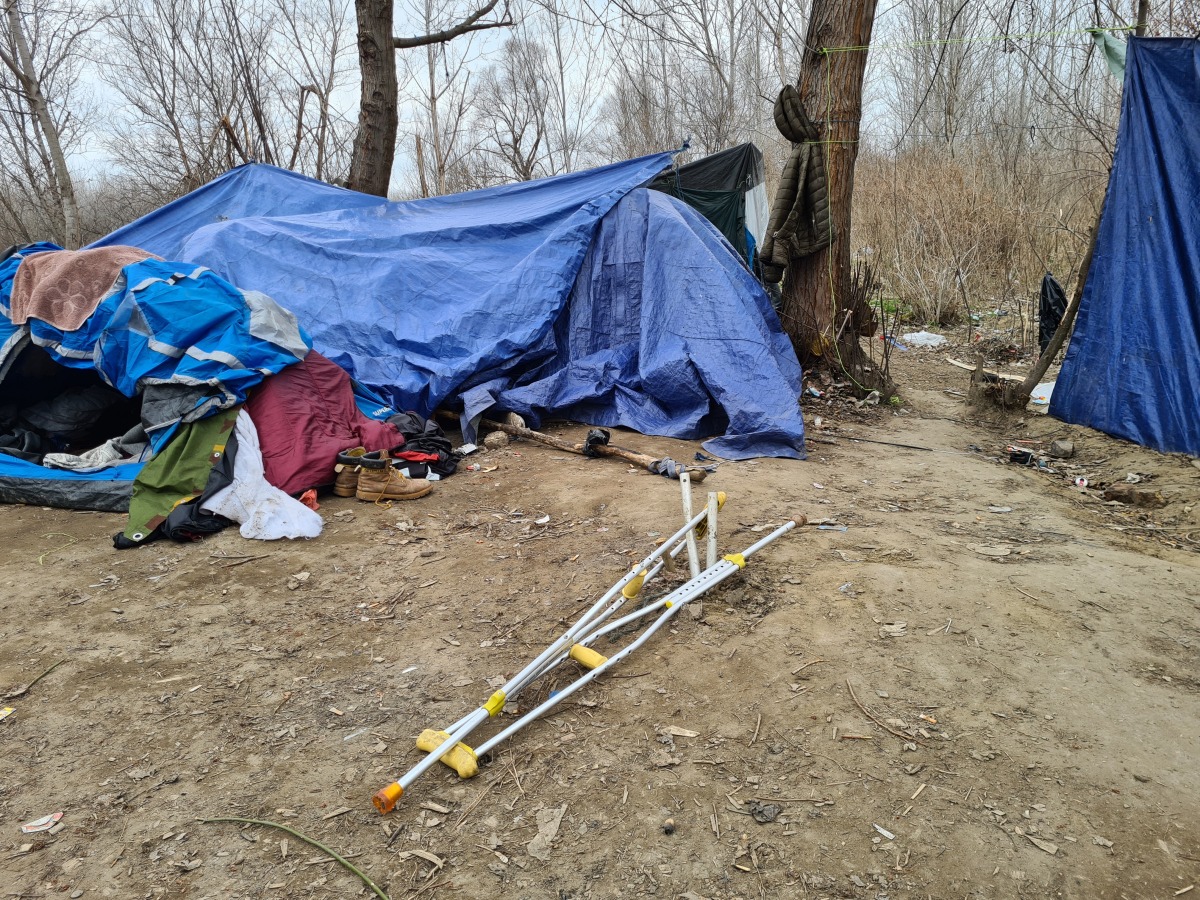
But after the influx of refugees over six years ago, shouldn’t this be something we should have improved on greatly? With the current EU policy, razor-wired fences, brutal pushbacks and the prevention of the right to claim asylum, sadly things are getting worse, not better.
Frontex states that they have seen a 148% increase on the western Balkan route in January 2022 alone. Serbia is known as an important transit country for people on the move (POMs). It is estimated that 60,000 people moved through there in 2021, heading to the EU to seek safety from war, persecution, poverty and many other human rights violations.
Yet the Višegrad Four, an alliance that has been set up between the Czech Republic, Hungary, Poland and Slovakia, have on the one hand deployed more police to the Serbian/Hungary border to assist with the violation of EU laws in pushing back refugees from Afghanistan, but, on the other hand, has declared how they will be accepting refugees from Ukraine, along with Serbia and Romania. All of these countries are involved in the mistreatment of refugees from countries such as Afghanistan, Syria and Iraq.
In 2015, Hungary built a four-metre high razor wire-topped fence along its borders to Serbia and Croatia. This spans the 109 miles (175 km) length of northern Serbia and all the locations this report mentions are within this area. With first-hand documentation of wounds caused at the hands of the Serbian police and those involved with the pushbacks from Hungary and Romania, the human rights violations at our borders seems to be going unnoticed, or perhaps uncared about by our governments.
- A head wound on a POM caused by police brutality.
- Wounds from the razor wire on the border fence between Serbia and Hungary.
Many POMs have spoken about how they have made it across Hungary but have been caught at the Austrian border, then pushed back without the opportunity to claim asylum or any type of documentation to Serbia. This is due to the pushbacks in Hungary being made legal. A report found here gives in a lot more details however in short, due to a state of emergency declared in Hungary in March 2016, pushbacks have been allowed. Many people are returned through special gates built in the border fence however reports of robbing, beatings, and humiliations by the police are regularly being reported to the team. This has been criticised by the EU and violates international treaties such as the Geneva Convention which Hungary has signed yet Hungary has now been getting away with this for 6 years.
During 2020/2021, 22,204 people were pushed back from Hungary. Most of these people are from Syria and Afghanistan. There were also increased reports towards the latter end of last year of people being pushed back from Austria to Hungary, then Hungary to Serbia. This report talks about the places along the Serbian/Hungary borders, and what exactly is happenings to the people who are seeking safety in the EU.
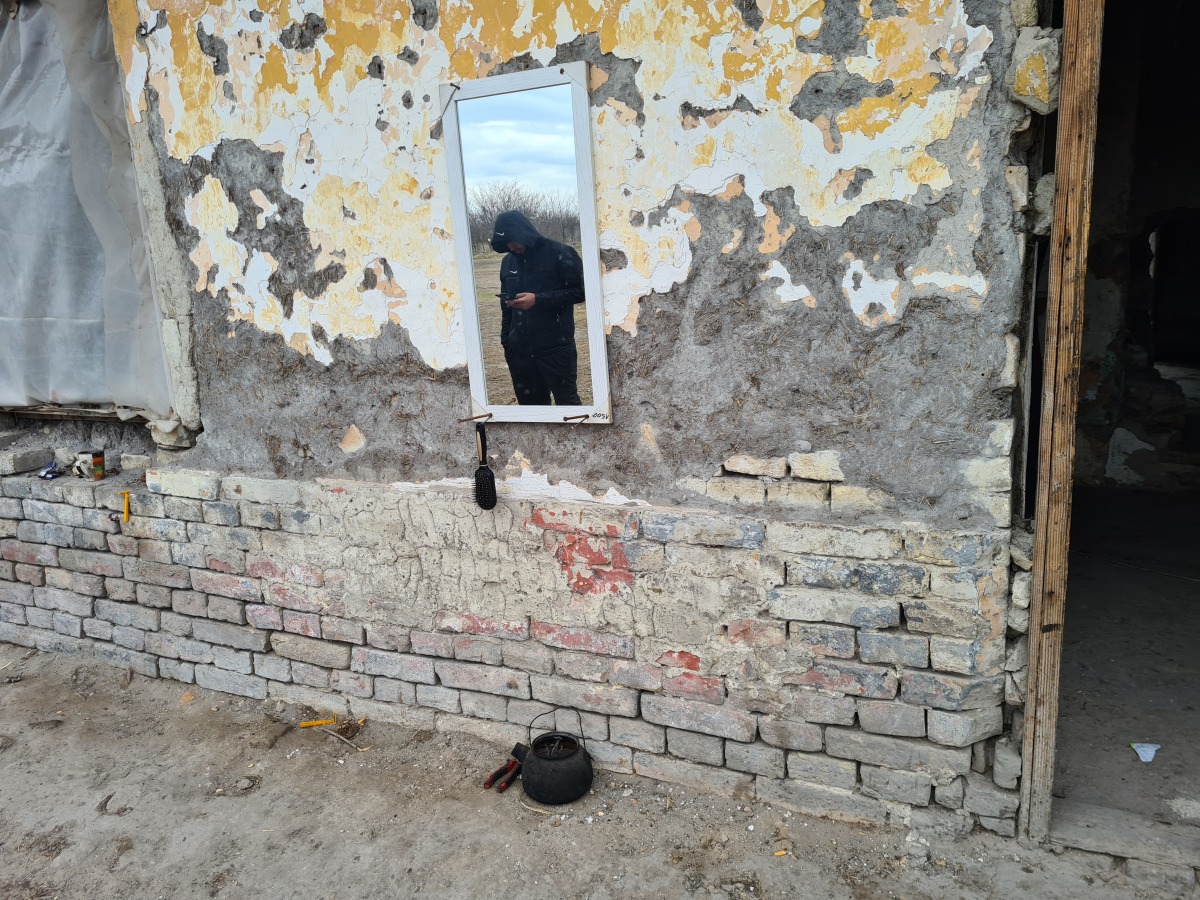
A young man uses his phone to contact family after using Collective Aids generator to charge his phone.
A registered organisation called Collective Aid also works along the northern Serbian border giving showers, non-food items and uses a generator to help POMs to charge their phones and even offers the basic requirement of a shaver for a haircut to maintain people’s dignity.
Evictions by the police are common in these locations which are mostly squats within abandoned buildings. Mass raids happen every couple of months and are mostly linked to protests from the local fascist group.
Recently a mass eviction happened where police hit each place along the Northern border one after the other. A few hundred people were taken but many also managed to escape.
People messaged stating that the police smashed open the doors and some people escaped out the window. They beat the people, robbed them of their money and phones then they were loaded onto buses and driven to a camp in the south of Serbia. They even hit the hotels where sick and vulnerable POMs stay. The injuries from these evictions are evident for weeks following this, and also the psychological effects on already scared and vulnerable people are massive.
Horgoš
Horgoš is a small town next to the border of Hungary in North Serbia. There are two main locations where POMs live. One squat is against the border fence and near a road checkpoint for crossing the border which can be easily viewed from the watchtower.
Here there are mostly Arabic-speaking people from Morocco and Tunisia but some from Syria, Iraq, and Palestine. In recent months there have been approximately seventy people living here, but this is set to increase again in the warmer weather. The people living here, like all locations spoken about, are very transitional.
The second location is at an old farm. Here there are many squatted buildings and it is more spread out over the area. There are normally 90-110 people here. Here there are mostly Farsi, Urdu, etc. speakers from Afghanistan, Pakistan, and India. It is very rare to find Arabic Speakers staying here however in the past week a Kurdish-Turkish group have been staying there as well as a young family from Syria.
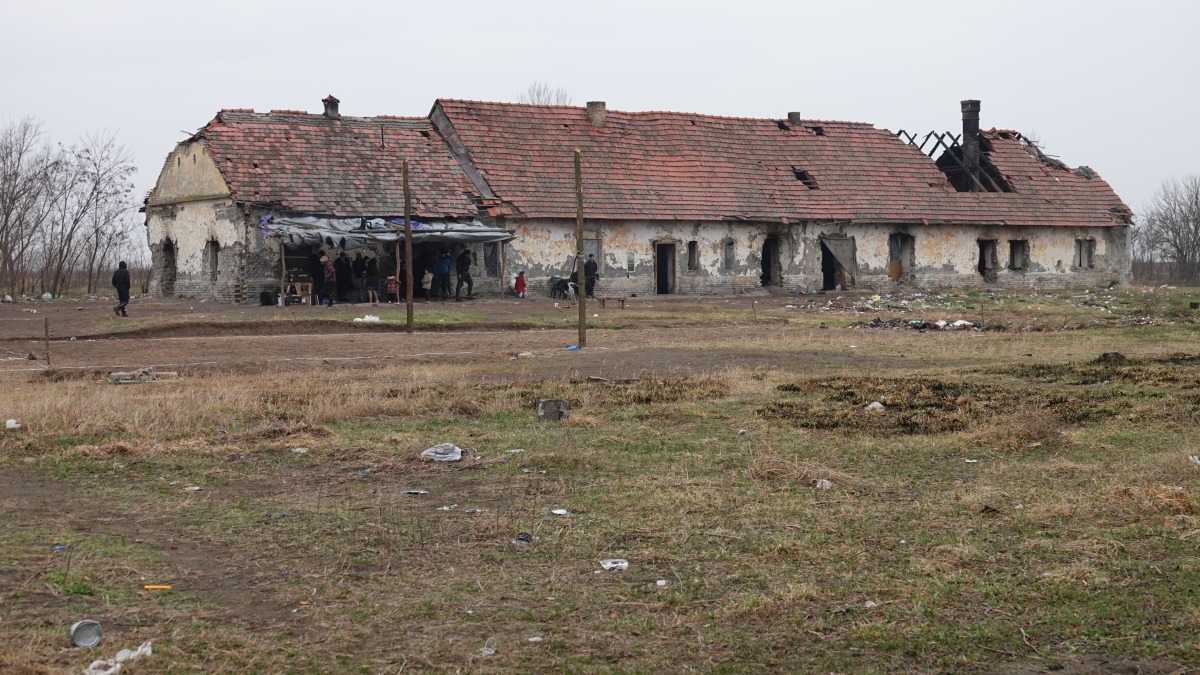
One of several abandoned buildings that people on the move are living in, Horgoš Farm, North Serbia.
As with the border area, living conditions are very poor here. With the abandoned buildings being used as squats, with leaking roofs, many tired and weary people sleep off their exhaustion after spending the night on “game”, the name given by many to the act of crossing the border and arriving at a destination where there is no risk of being pushed back from.
It becomes a game when night after night is spent trying to achieve this. There are many reports of phones being smashed and money being stolen during pushbacks by Hungarian and Romanian authorities.
As with most of the squats, due to such a high transition of people, there is a major outbreak of scabies, particularly with people coming from the refugee camps which are commonly referred to by POMs as a place that is highly infested with scabies mites. With open sores caused by the reaction to the mite, many of the people living here are in dire need of treatment.

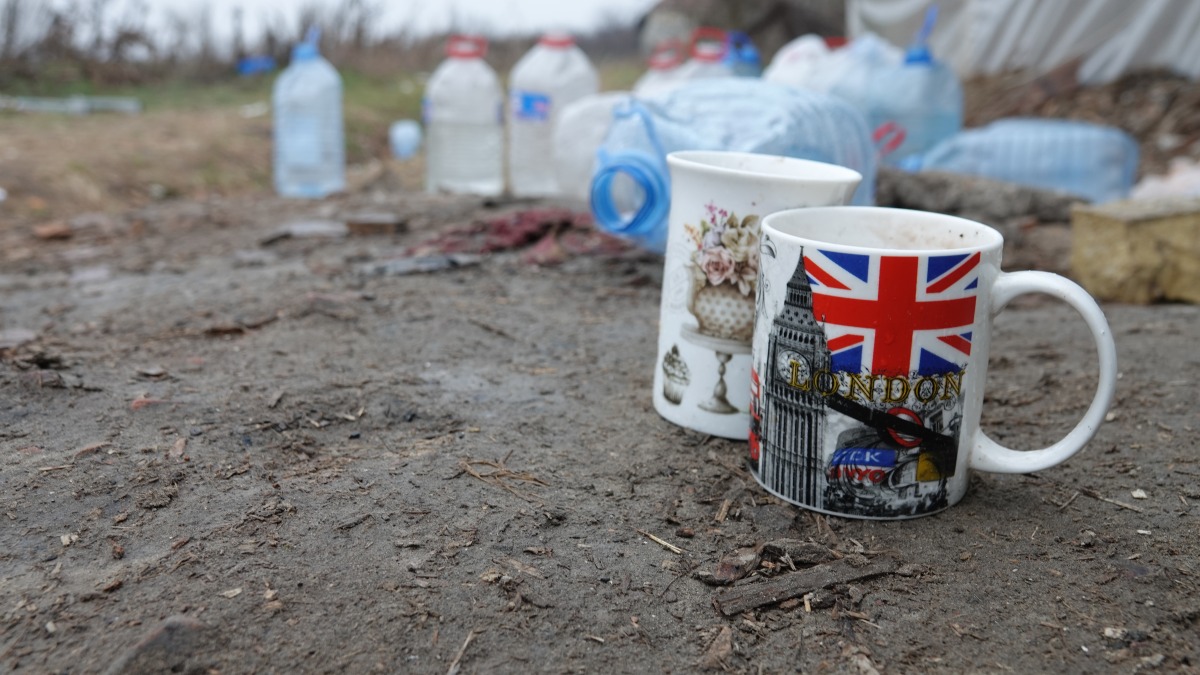
Abandoned farm near Horgoš
Taxis are regularly driving to this location bringing people back from the “game”, bringing people food/supplies, and also delivering live sheep to be killed. There are many fleeces around the property from slaughtered sheep that the POM’s have purchased from local people.
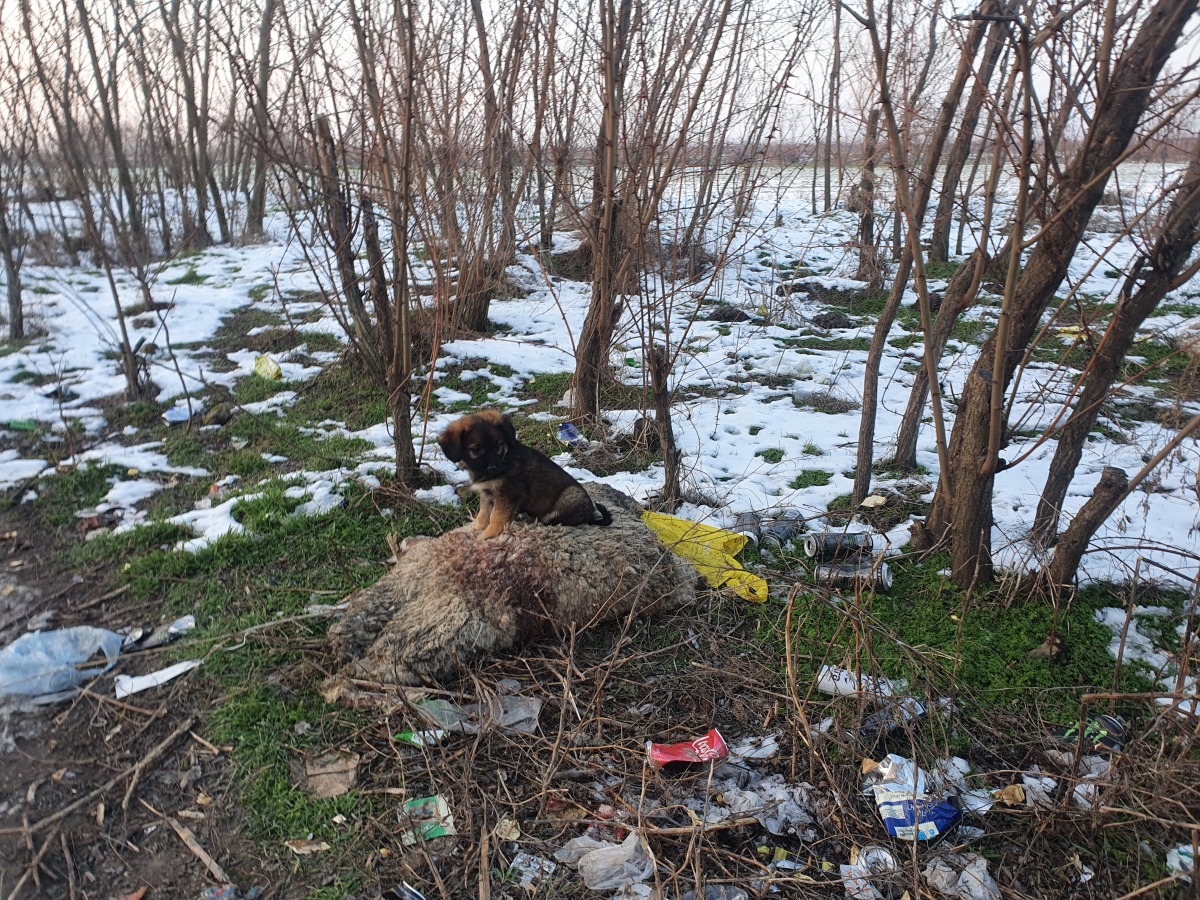
One of the many stray puppies sitting on slaughtered sheep to stay warm.
At the farms, the crossing of the border is very well organised where groups hit the fence at the same time with ladders. We see many injuries to hands from the razor wire on the top of the fence as well as injuries to knees and ankles from jumping down the opposite side.
You see many people going on “game” with thick gloves to protect their hands. Building barriers is not going to deter people who are fleeing their homeland but makes the lives of the POMs trying to make it to a safe country to ask for protection much more difficult, forcing them to take dangerous routes across Europe or into the hands of smugglers.
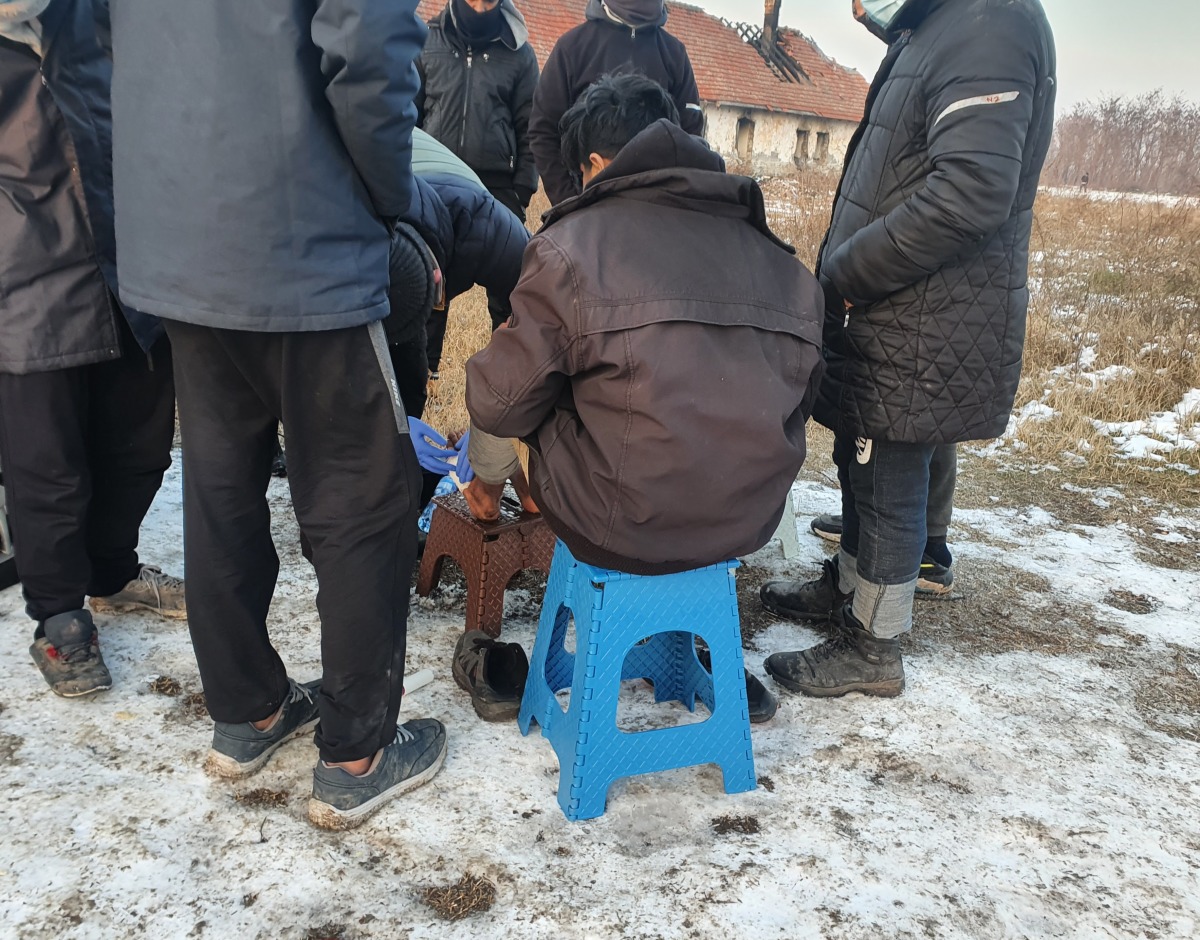
Giving wound care to a young man who has frostbite to his feet from walking in the snow in inadequate shoes.
There are many pushback stories from this location. One man from India tries every single night to go across the border. If he makes it into Hungary, he is typically gone for a few days before being returned through gates in the fence by police. If he makes it and is gone for a few days then pushed back, he has one night of rest before attempting again.
When I spoke to him, he had been in Serbia for 80 days and his only focus is getting through Hungary to prevent a pushback. He told me that if the border police know you speak English then they will beat you more to try and get information from you such as your route, how you crossed the border etc. After experiencing this a few times, he now pretends he cannot speak English.
He is trying to reach Spain as he has family there. He isn’t safe at home and he describes how his life is in danger if he returns home. He entered Serbia legally with his passport. He said that there is now an increase of advertised travel packages offered by travel agencies in India also to Belarus. As his passport was stamped and he would soon become illegal by overstaying his days, he then posted his passport to his family in Spain so that he is undocumented.
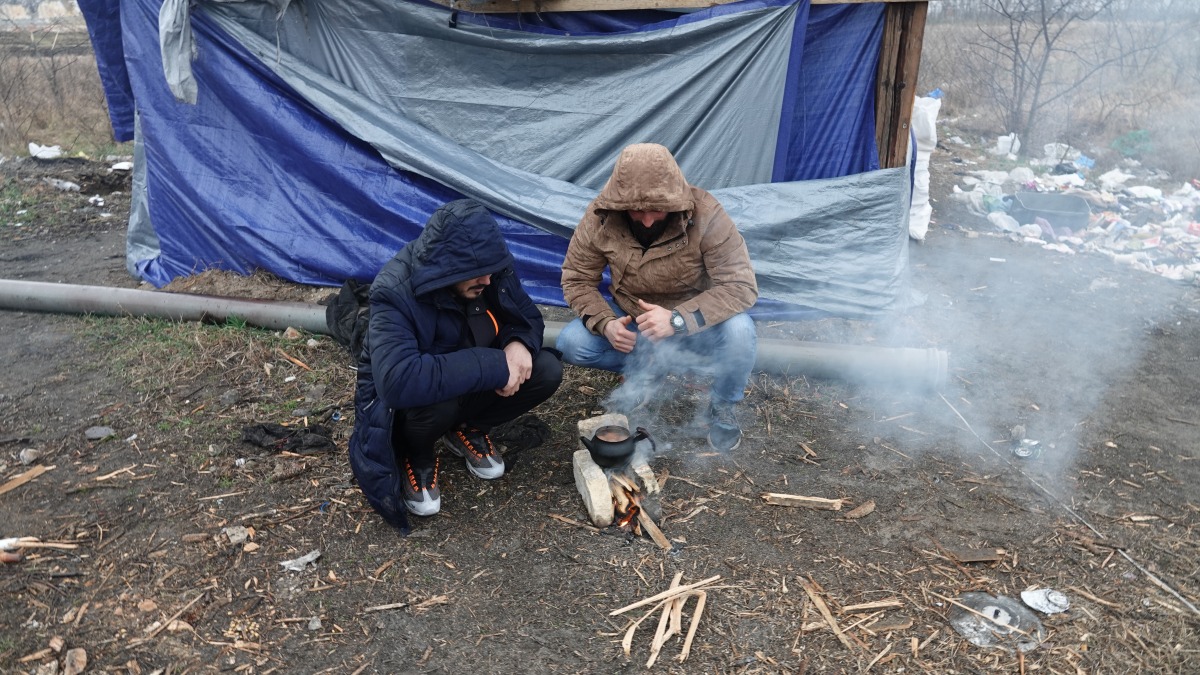
Turkish-Kurds huddled around a fire to keep warm whilst boiling two eggs.
We see many people who have been subjected to police brutality. One Moroccan man at the border was caught by the Hungarian police who saw our bandages on his feet, therefore, beat his toes. He has a major wound there caused by frostbite.
Police brutality cases are referred to Collective Aid who takes Border Violence Monitoring Network (BVMN) Reports from every case that they have time to do so to document the police brutality situation.
Subotica Train Tracks
The train tracks run through the city. Many people from Afghanistan and Pakistan live in abandoned buildings along the train tracks. There are many minors living here but we never come across families here as the conditions are too poor. There are approximately one hundred and fifty people living along the railway.
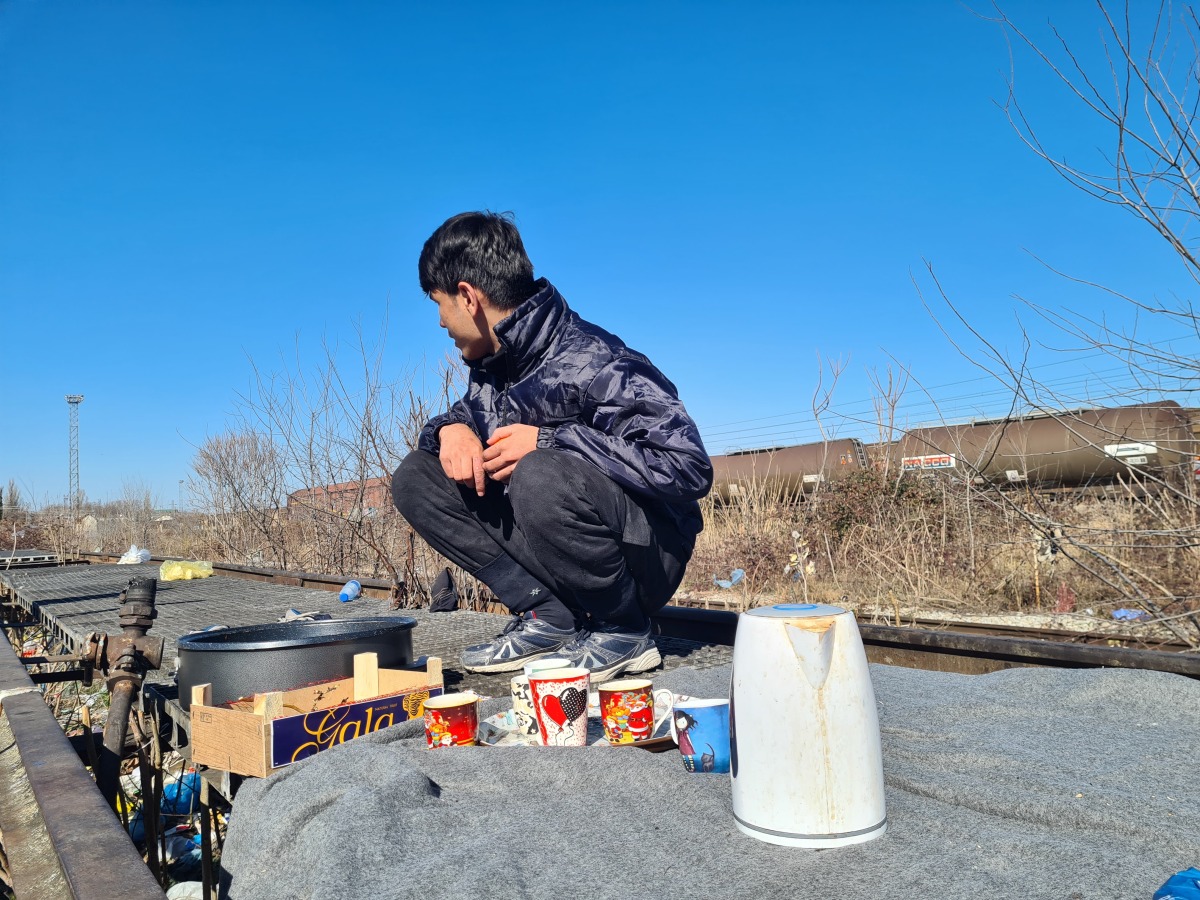
Minor warming himself in the sun. The kettle was boiled at the electric box that has been tampered with to get electricity.
As this area is in the city, they are regularly targeted by the police. The police often raid the places in the early hours of the morning and beat and rob the people. They seem to do this for a few nights and then leave them alone for a week or so. Perhaps it is to do with when they get paid as they only rob the people of money rather than belongings. With no way of making a complaint, these POM have no option but to accept that this will happen.
Recently these raids and cases of police brutality are becoming more and more frequent. During the day on the 1st of March, police raided the train tracks and took the people to the police station and told them they should either pay a fine or they would be taken to the camp in the south. Over one-third of the POMS that the team saw that day had signs of police brutality. Many people arrived back from being transported to camp three hours away in taxis with many injuries which the medical team assisted with.
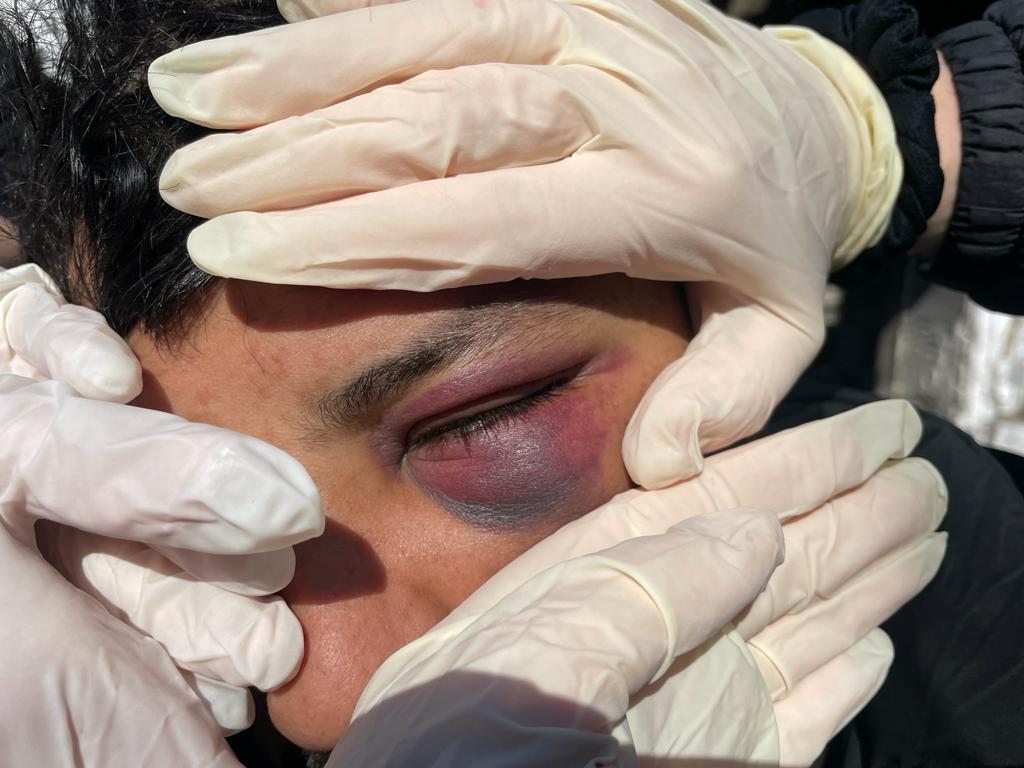
18-year-old boy from Afghanistan’s injuries following Serbian police brutality on 3rd March 2022. Photo taken on 10th March 2022
One had what he thought was a receipt for the money he had paid at the police station however it was a Decision on Return. Unbeknown to him, this is a declaration that he entered Serbia without legal grounds and therefore legally has to leave Serbia within thirty days. If he does not leave then he can be forcibly removed and in addition following this decision, he cannot apply for asylum in Serbia.
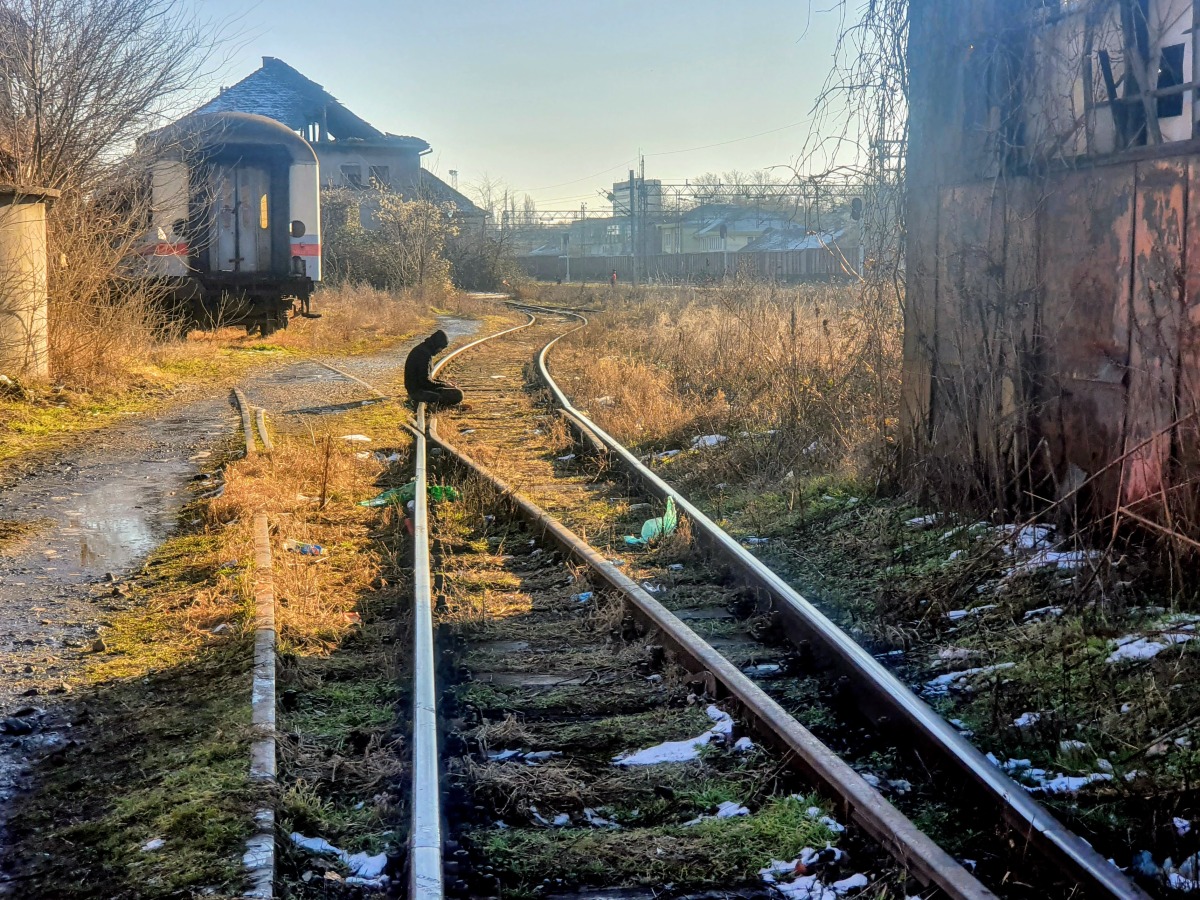
A lone refugee from Afghanistan sat on the train tracks trying to stay warm in the afternoon sun.
Two days later, evictions were carried out in this same location. The police openly in broad daylight beat the POMs as they put them in their vans. One of these locations was very public outside a supermarket with many local people around. The POMs were forced into the vans. There were approximately three police vans, six police cars, and around fifteen police personnel, so ample opportunity for one of the law enforcers to speak out about the brutality used against the POMs.
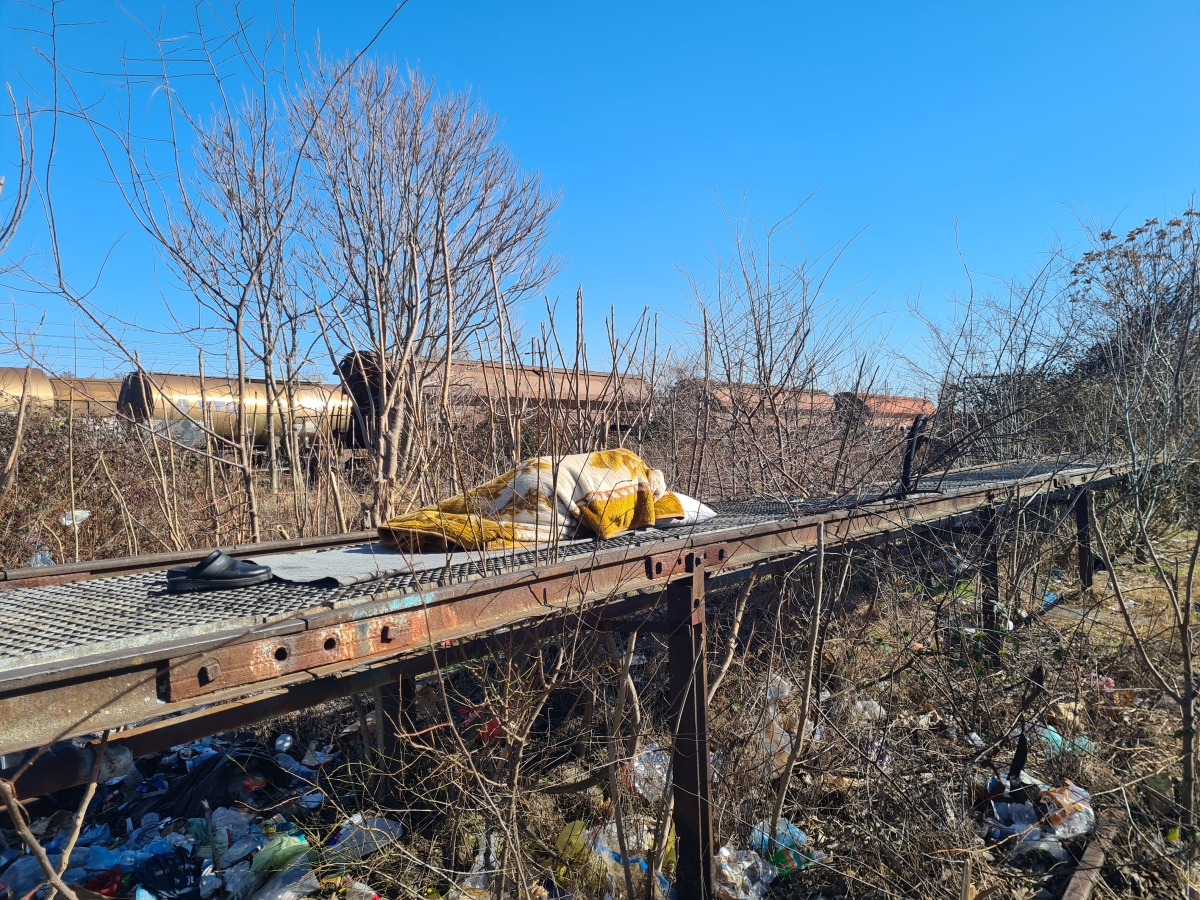
A young man from Afghanistan sleeping on a disused area of the train tracks after spending the night on the “game” and being pushed back.
Then again on the 8th March, the police had been and targeted the young men living here. They beat and robbed them. One man has a bandage wrapped around his head and a large bruise under his eye. No one wants to stay here, but again these people have no choice after being pushed back night after night.
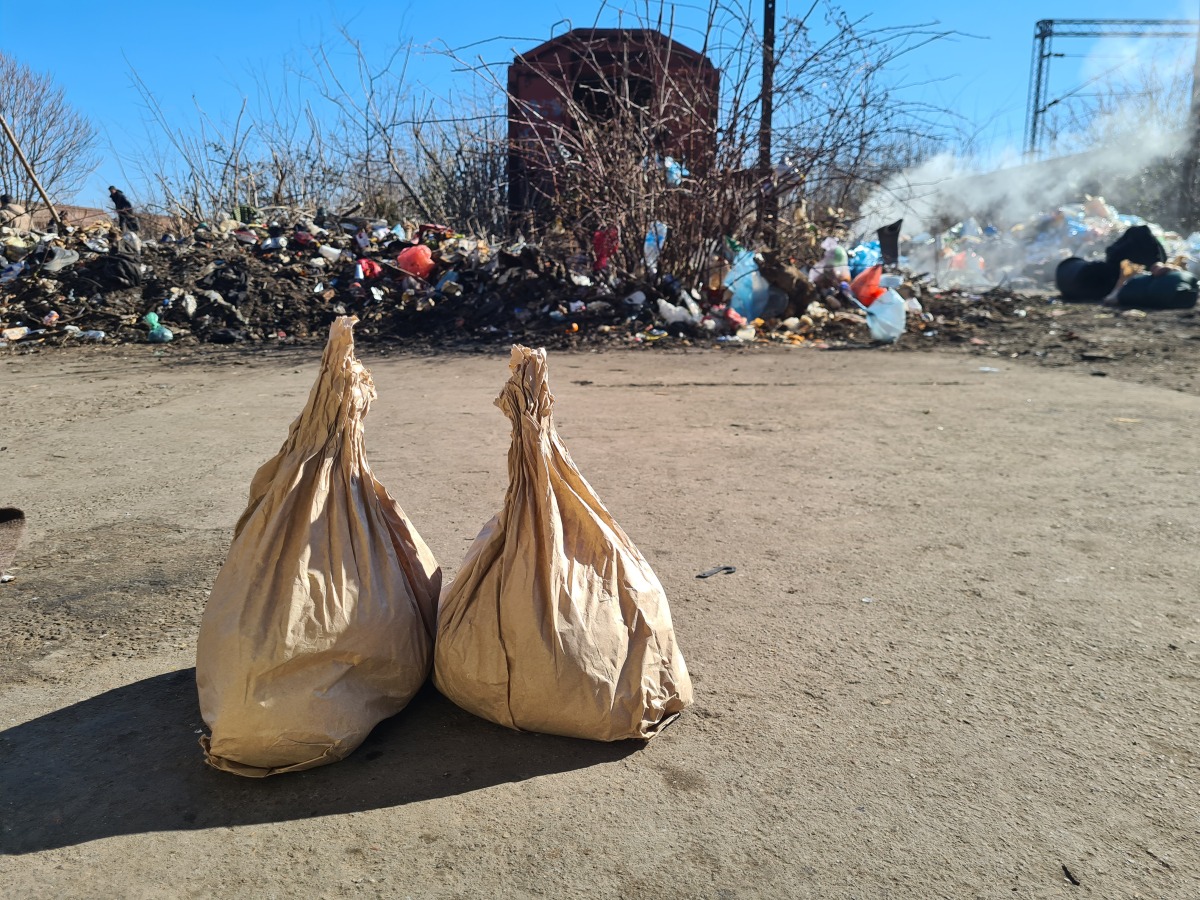
Distributions of much-needed bags of food outside a squat.
We find many people in this area who are without warm clothing, sleeping bags, and even shoes. Additionally, at the end of last year, a POM was killed on the train tracks. It’s a dangerous place to live. Not only due to the trains but also due to the extremely poor living conditions but also due to the frequent police and fascist attacks. They sleep with their shoes on ready to run from the police. Not having any shoes is a big problem as the train tracks are littered with broken glass, nails and oil from trains.
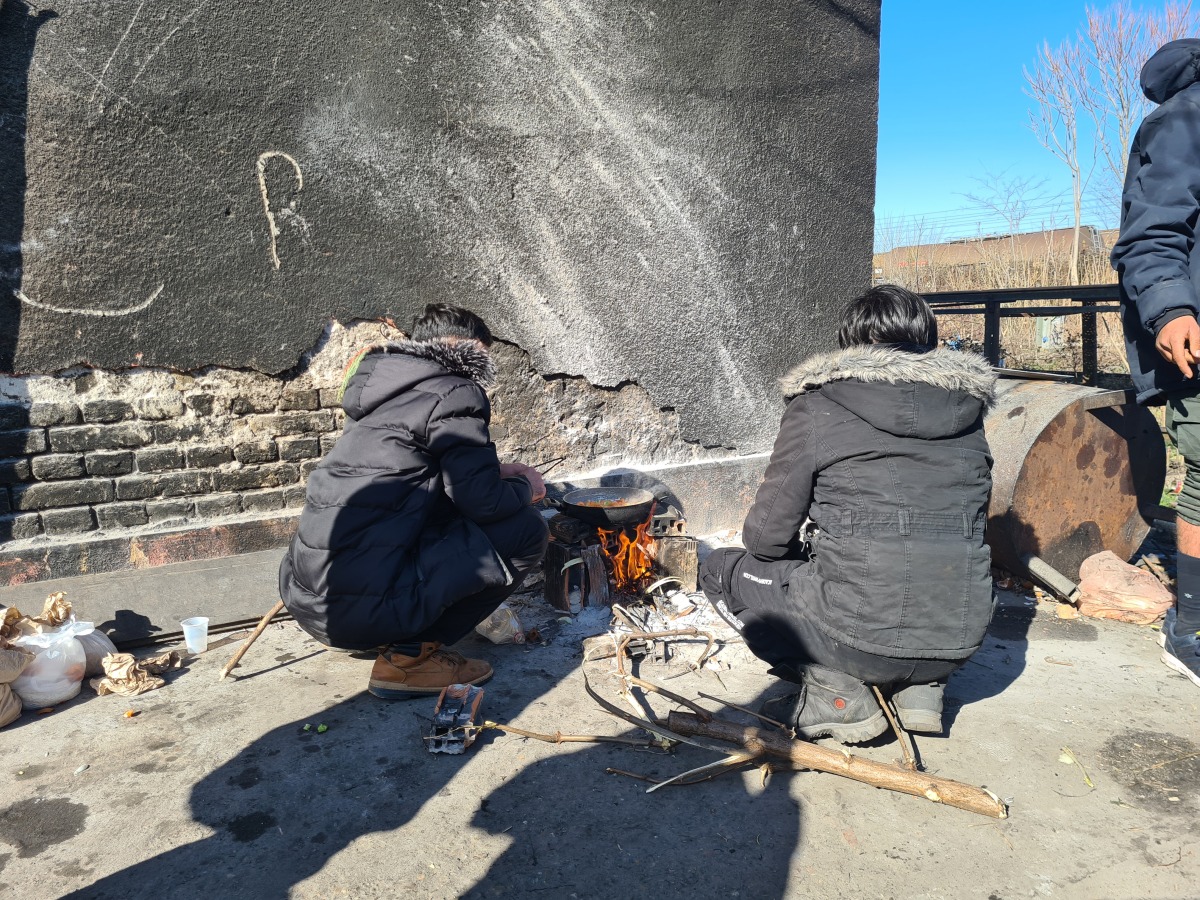
Two Afghan minors cook over a fire whilst other members from the squat await their turn to cook.
One story from a minor from Afghanistan is a young man aged fifteen years who we met on the train tracks. His English was perfect and he helped with much-needed translation for the team. His family invested everything they have in him so he could make the dangerous trip to the EU in the hope that his asylum claim is accepted and that family reunification would allow them to be together again in a safe place. He has been stuck here for nearly a month now and has been subjected to many beatings from the police.
Srpski Krstur
In Srpski Krstur, there is an informal camp where many people live in tents in a wooded area along the river. Here the river is used as part of the Serbia/Hungary border therefore there is no fence. Many people live in tents in this area so over winter, many people left for official camp or hotels that accept POMs but also a number remained. The numbers are now increasing here. They are all Arabic speakers here and a good mix of Syrians, Iraqis, Tunisians, Moroccans, and Palestinian.
Currently, about seventy people are living here. It is a long walk to the local village here so access to drinking water is not readily available. Many people drink from the river here and we see many gastrointestinal illnesses. During January, the temperature was always below zero during the day. You would see people walking along the riverbank with bags of food that they had bought in inadequate clothing. Tissue damage due to the cold in this area is a problem.

We have started seeing an increase in families in this location and will no doubt see many more in the warmer weather. They generally cross the river here in inflatable boats provided by someone that works for a smuggler. The river here is deep and fast flowing so is very dangerous.
Djala
Last year, the number of families living in Srspski Krstur decreased due to mounting repression by the police. Many relocated to an abandoned house on the outskirts of the village. This squat is where Arabic families stay, mostly from Syria but a few people from Iraq. There are normally ten to twenty adults here with children and young babies at any one time. It is very close to Srpski Krstur so they use the same way to cross the border in boats. This is better for families with young children who cannot climb the fence but also very dangerous in terms of the fast-flowing river.
Here there was a malnourished baby called Yousef. Yousef was just twenty days old when he was found to be very low in weight. With education to the mother about increasing feed and close monitoring of the weight, Yousef became a lot stronger.
It took a lot of coordinating to see Yousef in this time due to his mother desperately going on “game” very regularly. At one point they were gone for several days and made it to the Austrian border to be caught and pushed back to Serbia. During this time they were held outside in freezing conditions by the Hungarian authorities despite the mothers pleading for the month-old baby to be taken inside out the elements.
Yousef, unfortunately, developed a respiratory condition and conjunctivitis following this experience which was successfully treated by the medical team. Recently it was heard that she has made it with her two children to Austria.
It is in the area of Djala and Srpski Krstur that there is a very angry Commissariat. The Commissariat is here to protect the needs of the refugees but this female officer is very difficult. She aggressively speaks to organisations who are there to help and sets them time limits for how long they can be in an area despite the needs of the people.
Sombor
Sombor is on the Serbian/Croatia/Hungary border and is known for its fascist area involvement. People have been photographed who help the POMs here and posted on a Facebook page and death threats have been issued.
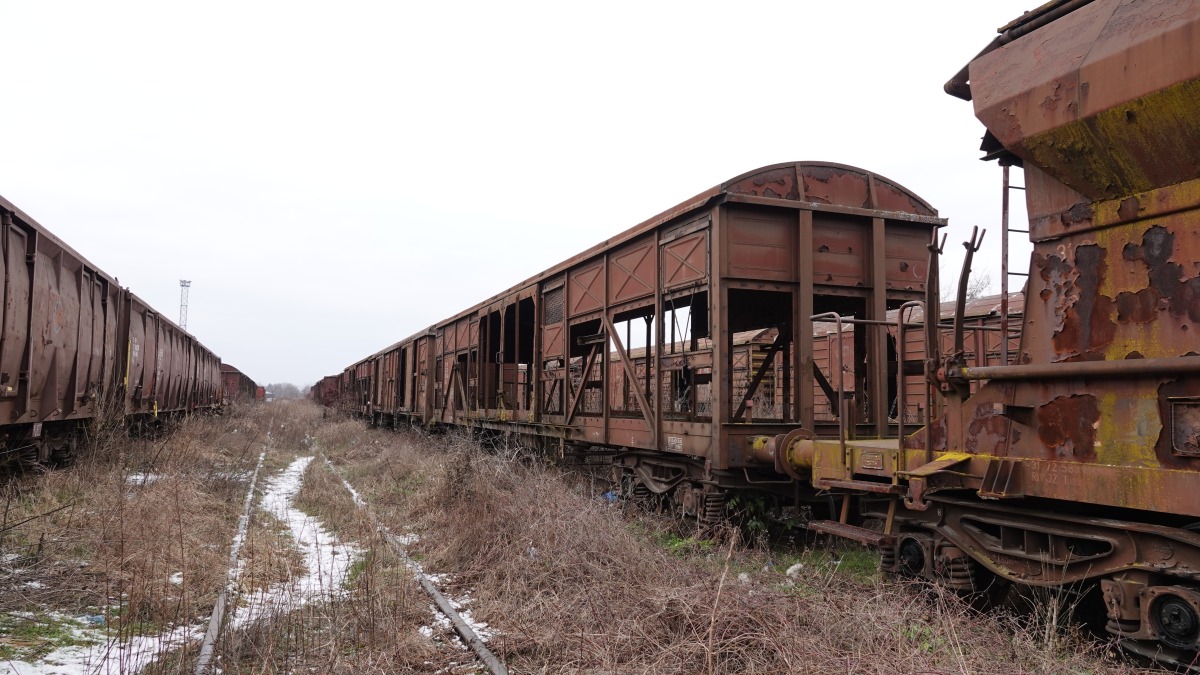
Old train carriages on Sombor train tracks where people on the move live.
There is a group of people living in abandoned train carriages most of which are from Afghanistan but some from Pakistan. At the moment about forty people are living here but it has been very few over winter as it is extremely cold to live here. Numbers can raise to between 100 -150 during the spring and summer months.
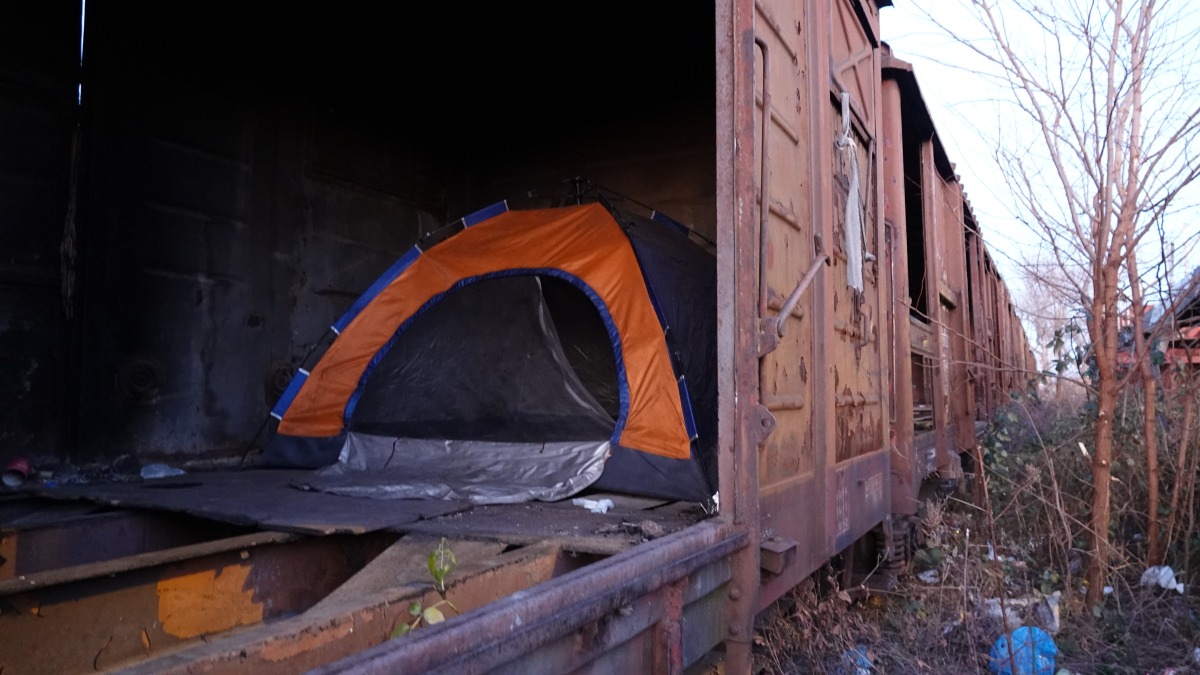
A tent in one of the many abandoned train carriages at Sombor where people on the move live.
There are a group of minors aged just thirteen years old here. They have been here for some time and are completely alone. You see them playing in amongst the carriages and on the tracks as well as cooking boiled eggs for themselves. The eggs are provided by Collective Aid during their once-weekly food distribution here. This is a horrendous place for these children to be.
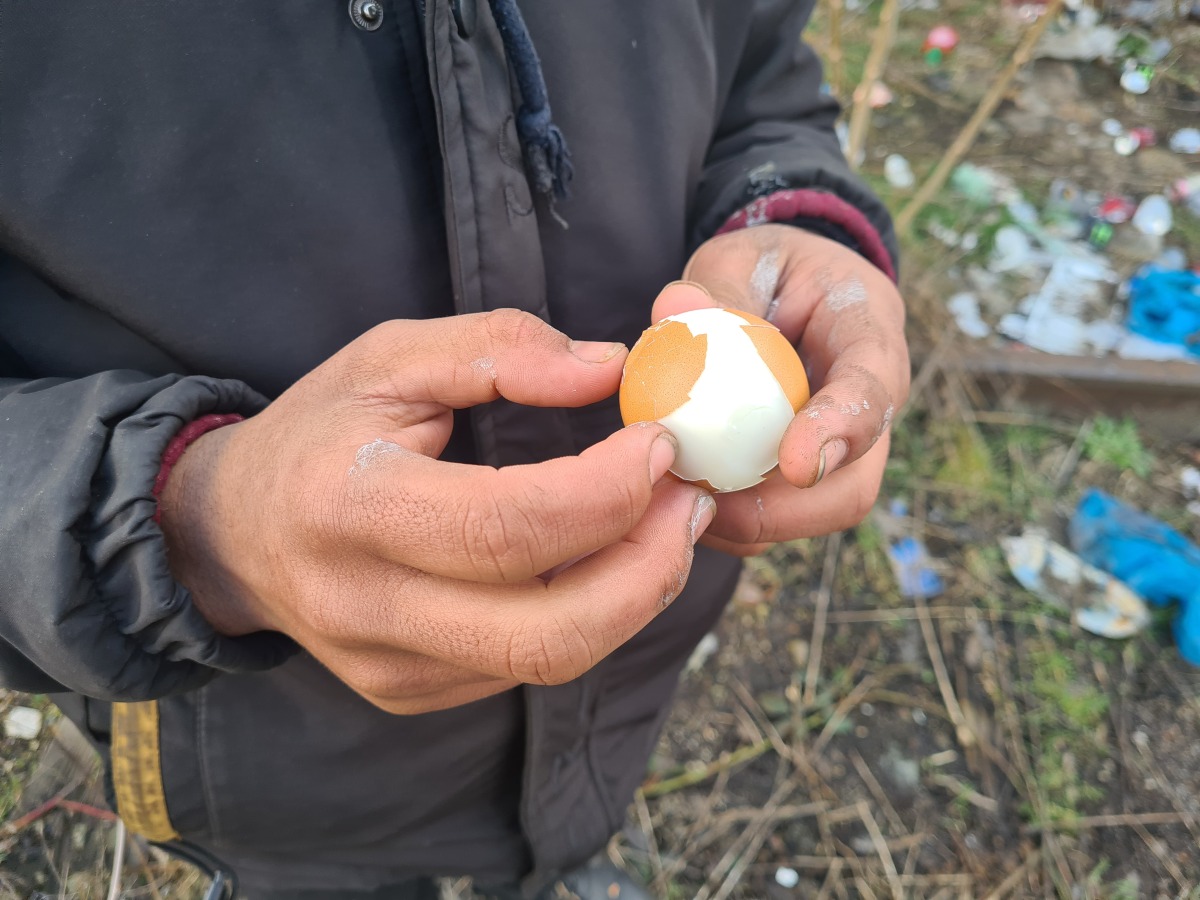
Rough hands of a 13-year-old child as he peels an egg he has boiled for himself.
This area is targeted a lot by the police. During raids, they smash the sides of the old train carriages so that in winter it is impossible to stay out of the elements. There are areas along the train tracks where people have wired plugs into the electric boxes so they can charge their phones.
This is common in a lot of squats but is exceedingly dangerous as its mains electricity. There is a squat in the middle of Sombor next to Lidl and a bus station. Here there are a lot of Indians, Pakistani, and Afghans. Numbers are around thirty people in recent weeks and set to rise in spring. It is not a very nice place at all and everyone has respiratory problems due to the cooking being done inside without ventilation. Also. there is a massive scabies problem here.
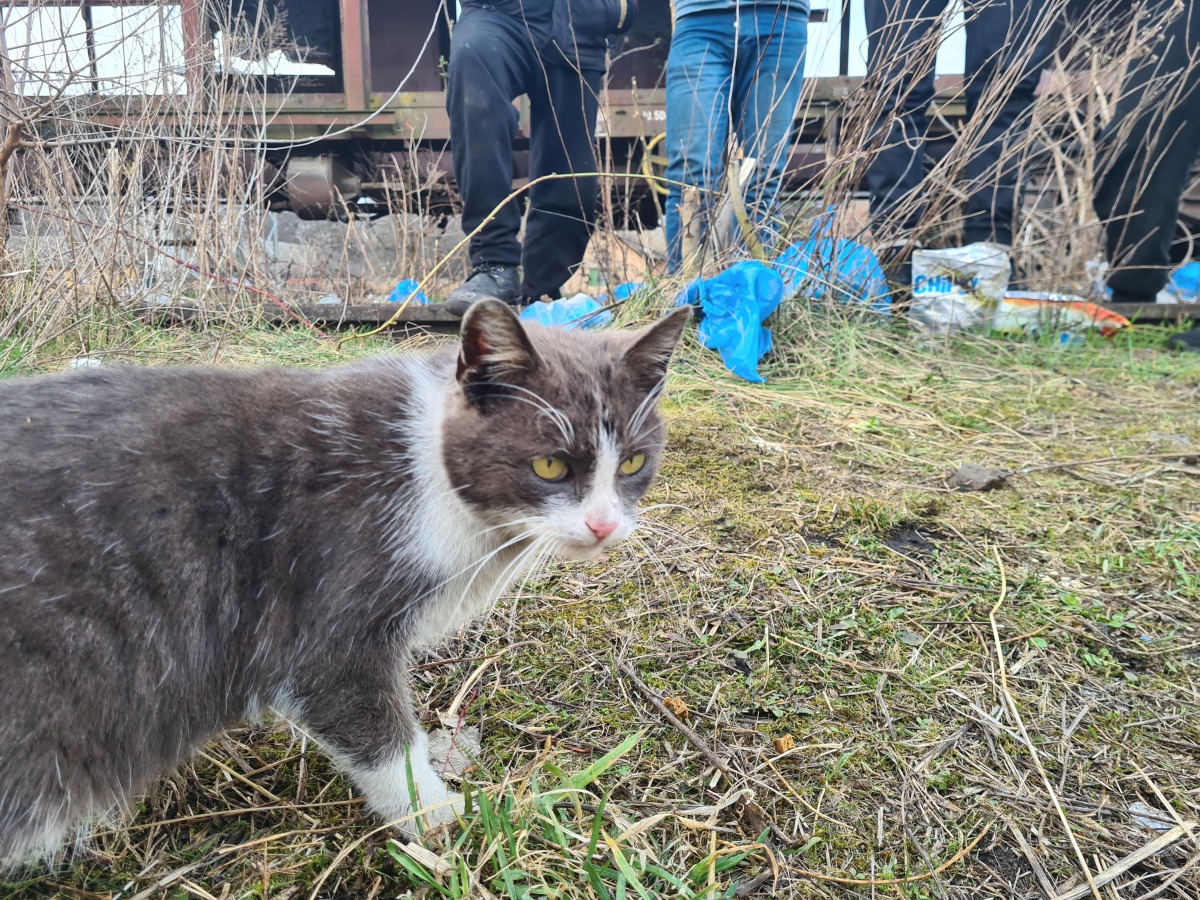
The cat that lives with the minors in the train carriage with the youn boys, all from Afghanistan in the background.
An old factory outside of town has many people living around. It is mostly Arabic speakers. There can be over one hundred people here but over winter there is on average of about 40-60 people. There is a large amount of rubbish here and a massive rat problem. A few weeks ago, part of the factory where people lived fell down, luckily no one was hurt.
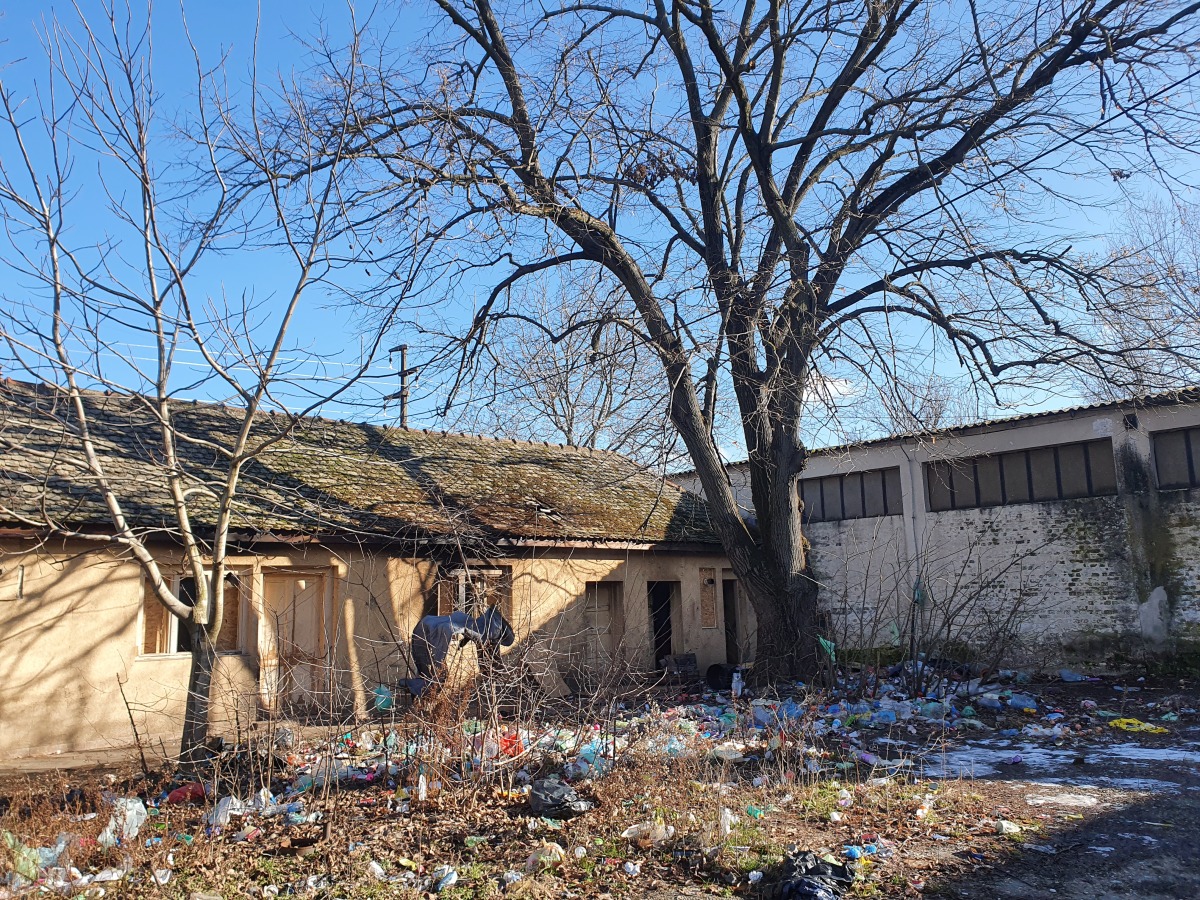
Old abandoned buildings at the factory where many people on the move live, North Serbia
Here a group of young men from Syria who were attempting to cross the border at Kladusa, Bosnia spoke at length about how they had been pushed back and beaten so many times by the Croatian police that they decided to come to try at this border instead. They also experienced this same brutality from the Hungarian police. Here, a young man shows his bruises on his shins following the Hungary authorities catching him, then beating them with batons before pushing them back to Serbia.
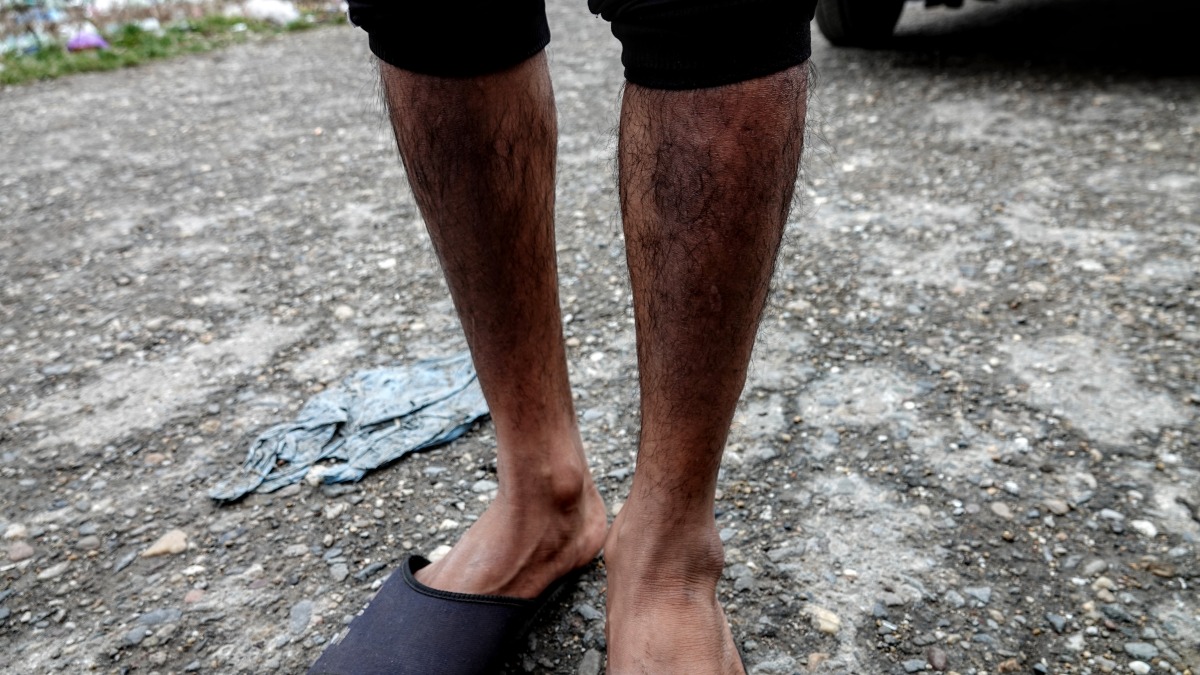
Bruises on the shins of a young man from Syria who was beaten by the Hungarian authorities, North Serbia.
Majdan
Majdan is a village on the Serbian/Romanian/ Hungary border which has become an increasingly set route in the winter of 2019/2020. During this time, pushbacks were mostly unheard of so POM’s didn’t ever collect at the border in squats attempting the game, as the passage into Romania was accessible. It was during the summer of 2020 that reports of Pushback materialised and POMS started staying in abandoned houses and a milk factory in this area to attempt the game.
We see a lot of police brutality wounds here mostly due to the Romanian police. People try and get around the fence on the Hungary border by crossing into Romania and then moving upwards. There seem to be more broken bones due to police brutality here than in any of the other places. It is also very poor living conditions with no access to running water and with the nearest official camp fifty kilometres away.
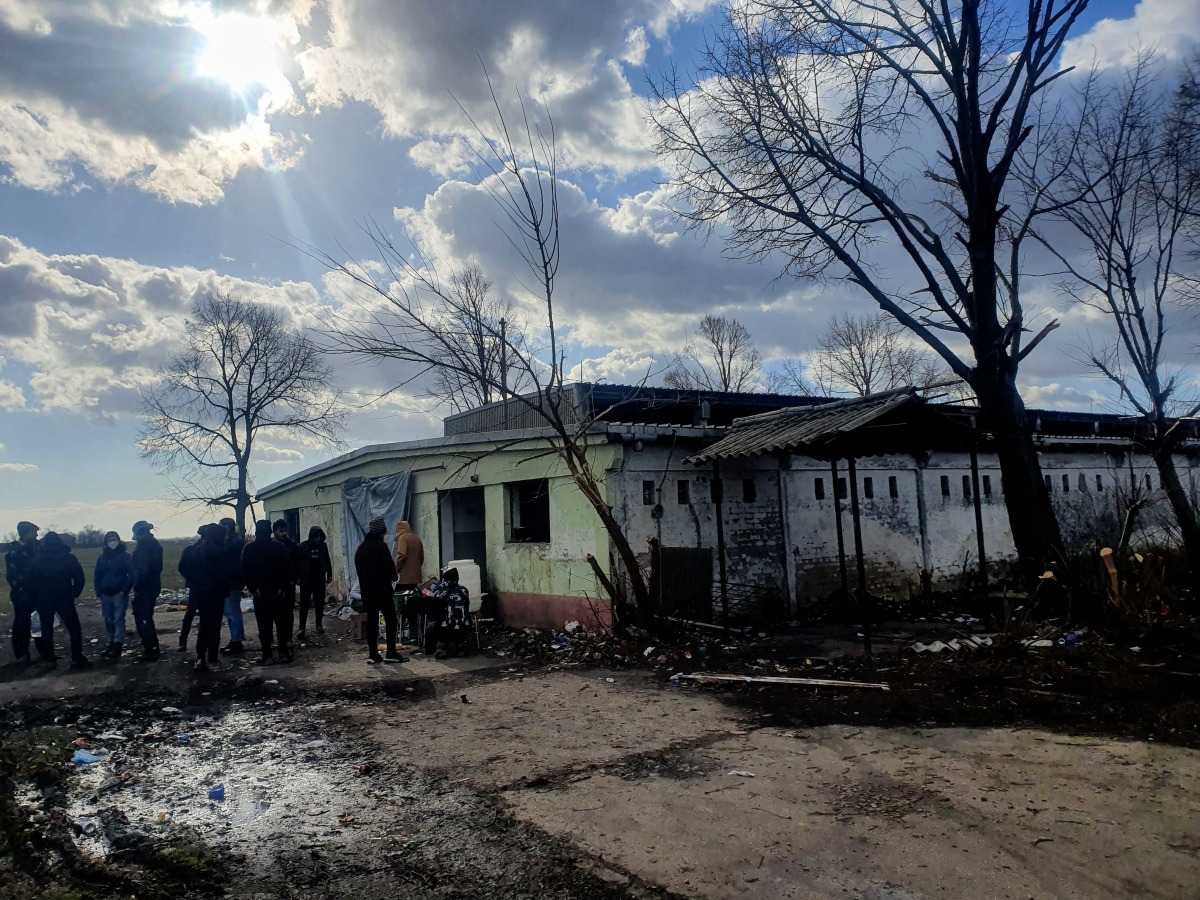
People on the move collecting outside the milk factory as a distribution happens, Majdan North Serbia.
Arabic speakers live in an abandoned milk factory in poor conditions in tents within the building. There are normally approximately fifty people here but this will continue to rise as it gets warmer. There are so many reports of violence from the Romanian police during pushbacks where they use tricks of humiliation as well as violence to try and deter POMs from crossing the border here into Romania.
Additionally, Romania, during pushbacks are denying the people fleeing persecution in Syria and Iraq, the right of claiming asylum. Instead, they were taken to the bordered and told “no asylum here” and whilst being beaten, robbed, their personal belongings destroyed and in some cases attacked by dogs.
This is another place, where if POMs are handed over to the Serbian police by the Romanian authorities after they are denied the right to claim international protection, they receive a Decision on Return, giving them thirty days before they can legally be removed from Serbia.
During some mass evictions in February, a POM managed to conceal his phone. He was on the bus heading south to a camp and messaged to see if it was known where he was going and if there was any assistance for him. He reported a raid at the milk factory by Serbian police. All the POMS were beaten, robbed, hands cable-tied behind their backs and loaded onto buses. They were humiliated and beaten throughout the seven-hour trip south. They were put in a camp and the very next day he left and got the bus back to the north. The polices had slashed all their tents and destroyed his belongs including his asthma inhaler.
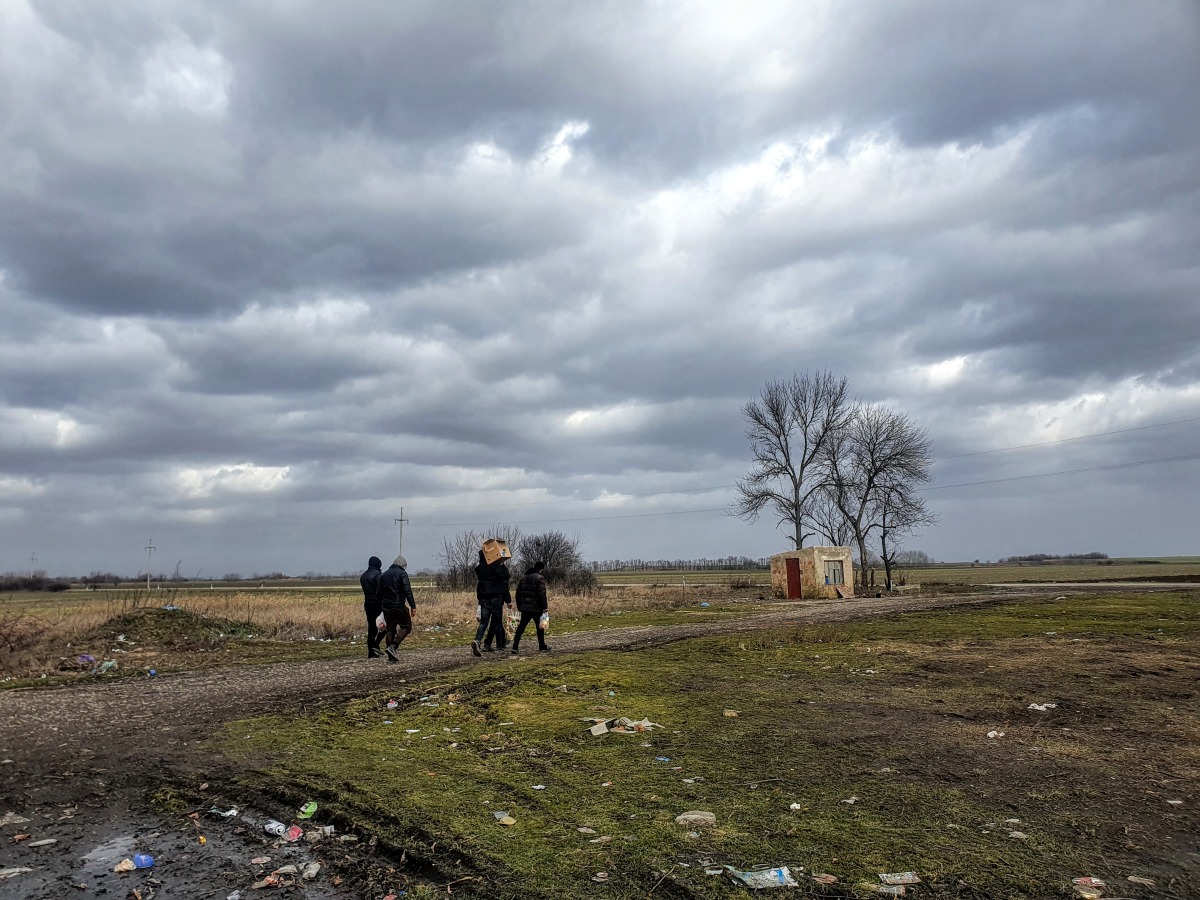
A group walking back to Rabe with their food supply given to them at Majdan, North Serbia.
Hotels
Several hotels across the north of Serbia open up their doors to POMs giving them a safe and warm place to stay but obviously like all hotels, at a cost. Many of these places are criticised by local people and may have to pay money to the Serbian mafia to continue providing accommodation to these people in need. The medical teams visit a couple of these hotels, providing much needed medical care to these at-risk people.
Many people with serious frostbite wounds were seen over the cold winter months after being forced into paying for a room as they are unable to live in the cold, poor conditions of the squats due to extreme tissue damage. Many people share a room to reduce the cost but the hotels that accept the medical team do genuinely tend to care greatly about the human suffering they are seeing.
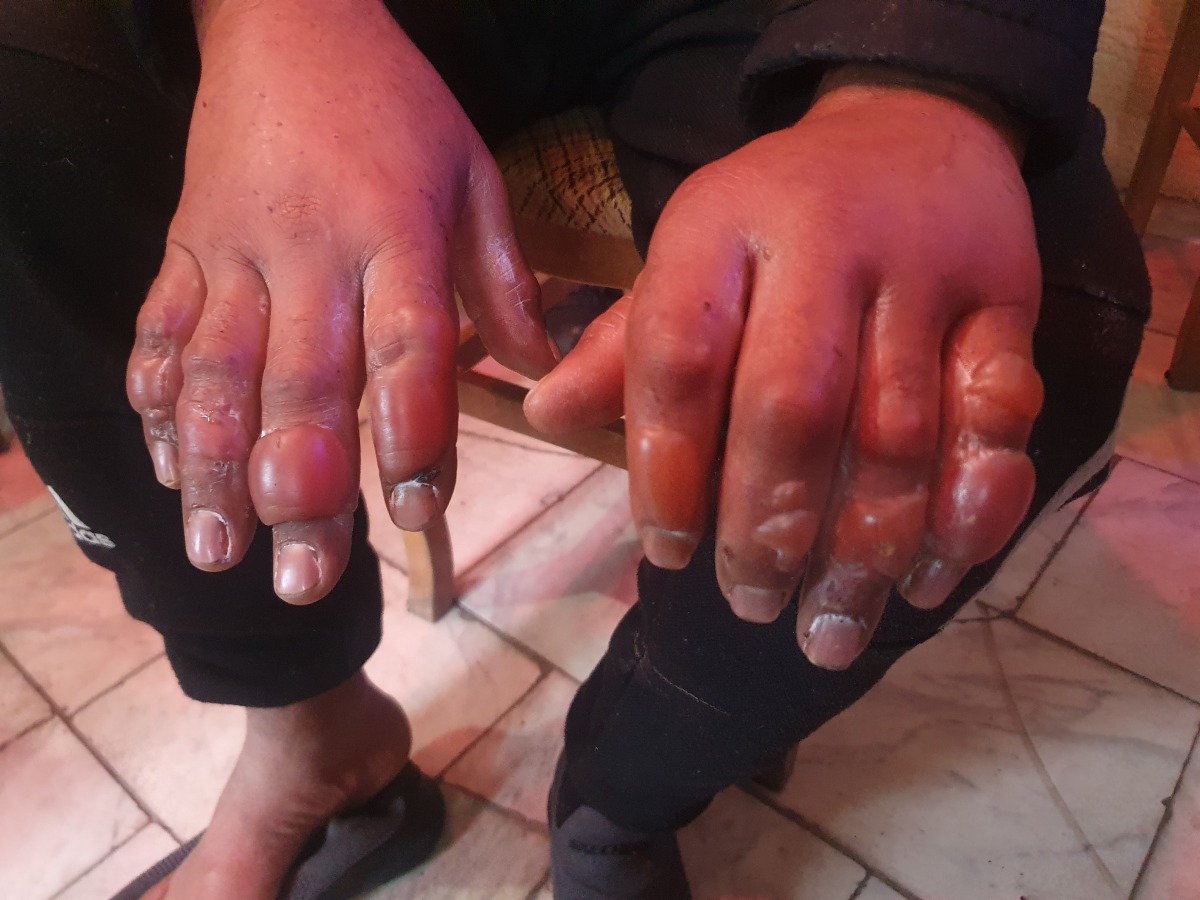
First photo of frost bite injuries to refugee from Syrias hands in North Serbia. The follow up images are too severe to show.
A lot of patients were seen this past month with frostbite due to exposure to the cold. A Syrian man has been seen for the past four weeks after having severe frostbite on all his fingers. He is likely to lose the end of two of his fingers to one of his hands and will need support to access the hospital when the time comes to operate.
The police do come and raid these hotels and like all places they mistreat the POMs, rob them and transport them to camps in the south of the country. Many people return from their trip on the game with injuries caused by brutality from the Hungarian authorities. Again resting their bodies from the beatings before attempting the game again.
Recently a young man from Syria showed us a dog bite. He spoke about the beating he received from the Hungarian police after he was caught. He thought the torture was over and he was free to go but as he walked away, they released the border dog on him and he received a dog bite to his upper arm.
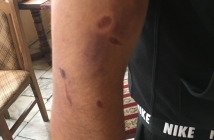
Two men from Syria were assessed who had jumped from the fence between Serbia and Hungary and damaged their ankles. As they couldn’t mobilise during their pushback, they had an x-ray whilst in Hungary, and their ankles were found not to be broken. However, as they could not walk at all, they were given blood thinning injections to prevent blood clots before them being returned to Serbia through the gate and left out in the cold on the other side.
As the refugees from Ukraine are welcomed into the EU borders, these forgotten people stuck at the EU external border of Serbia continue to be the forgotten ones. Left bruised, robbed and traumatised time and time again, frustration amongst humanitarian workers grow as they watch limited but much need funding moved from here to the borders of Ukraine. Our hearts break for the people trapped here, whose only crime is in the eyes of some, is their lack of white European features. I ask myself regularly where is the compassion?

